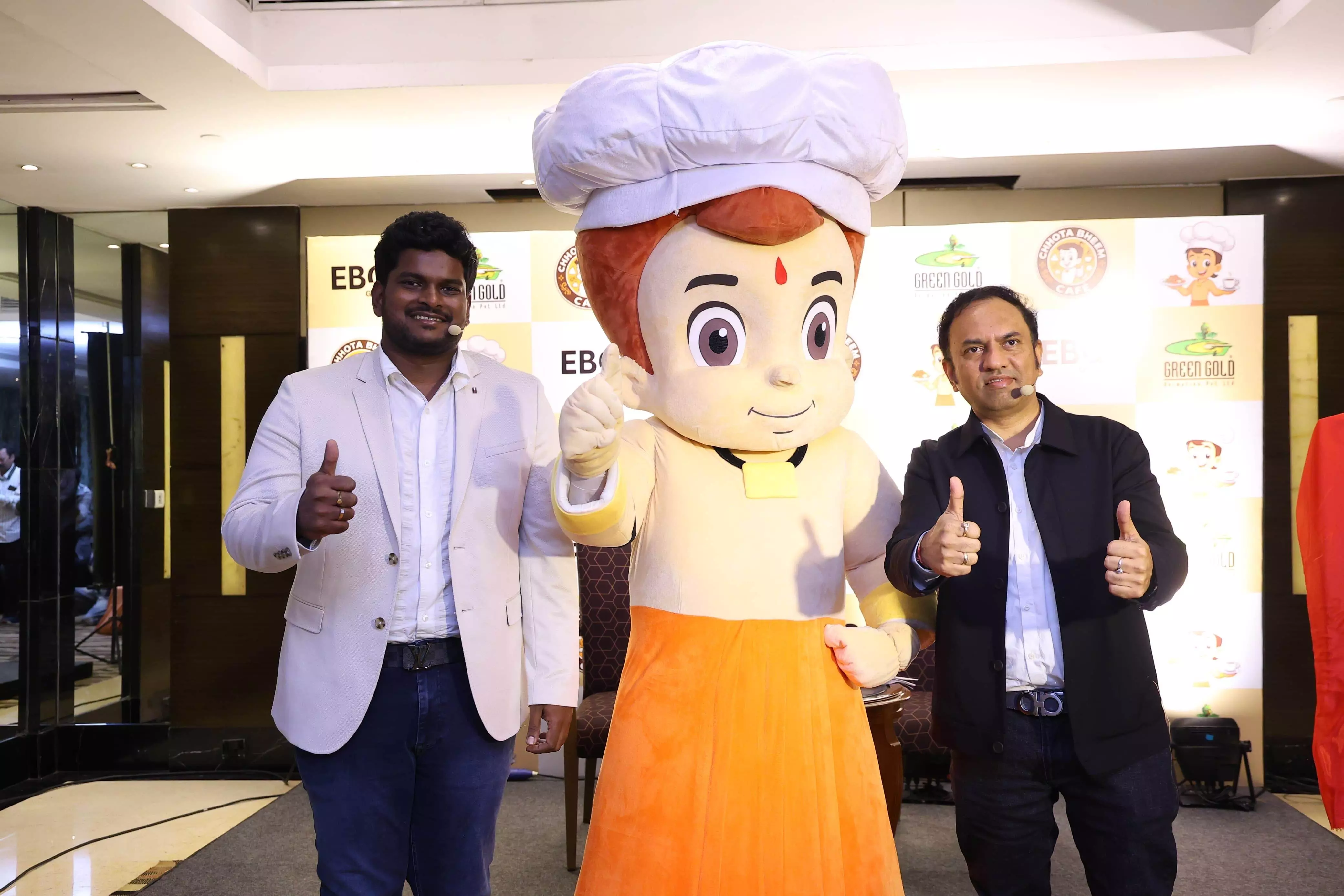Chhota Bheem cafe to open in Hyderabad’s Hitech City, blending food, play and storytelling
Hyderabad will see the launch of India’s first Chhota Bheem Cafe, a partnership between Green Gold Animation, the studio behind the beloved character, and EBG Group
By - Anoushka Caroline Williams |
Hyderabad: For nearly two decades, children across India have grown up with Chhota Bheem, the orange-dhoti-clad hero of Dholakpur, whose adventures have unfolded on screens big and small.
Now, for the first time, Chhota Bheem is stepping out of animation into the real world, not as a ride or a toy line, but as a themed cafe where food, play and storytelling merge.
Hitech to get two outlets
Later this year, Hyderabad will see the launch of India’s first Chhota Bheem Cafe, a partnership between Green Gold Animation, the studio behind the beloved character, and EBG Group, a multinational conglomerate.
Two outlets are planned for Hitech City by December, before the concept expands across India.
A first for Indian IP
Globally, themed cafes built around characters, from Hello Kitty to Pokémon, are part of everyday family culture. In India, however, most food experiences revolve around generic play zones or international mascots.
“India has not seen its own IPs take this leap,” said Dr Irfan Khan, Founder and CEO of EBG Group. “We wanted to change that with an Indian-created character. Our philosophy is always guided by the three Ps: people, planet and profit. This cafe is an extension of that thinking.”
Part of cultural landscape
For Green Gold Animation, the move is also a way to reclaim space in a market where Indian characters rarely make it beyond TV licensing.
“Chhota Bheem has become part of India’s cultural fabric,” said Rajiv Chilaka, Founder and CEO of Green Gold Animation. “But many fans don’t even know where to buy official merchandise. This cafe will not just serve food but also act as a hub for authentic products and storytelling experiences.”
Why Hyderabad?
That the cafe is starting in Hyderabad is not incidental. The city is home to Green Gold’s headquarters and has, over the years, nurtured a strong creative ecosystem from animation to gaming. It is also where EBG Group sees a consumer base willing to experiment.
“Hyderabad balances cosmopolitan growth with a deep cultural connect,” Dr Khan noted. “Our surveys showed acceptance would be high here. It’s the right city to test a model like this before scaling.”
Food, play and family
What will the cafes look like? Not just cartoon-themed walls, Chilaka insists. The spaces are being designed with children’s safety and energy in mind: no sharp corners, safe layouts, and interactive play zones.
“Children today are very savvy,” Chilaka said. “They are exposed to international experiences. They expect the same quality here. So our cafes will be smart, clean and child-centric. At the same time, we want parents to feel comfortable too, even offering work-friendly corners for them to sit with a laptop while kids play.”
The menu, meanwhile, is pitched at health-conscious parents.
Millet-based meals and balanced snacks will take precedence over the deep-fried fare usually associated with play cafes. “Parents are more conscious now,” Chilaka said. “We want kids to enjoy food that is both fun and healthy.”
Scale and jobs
The rollout will begin with two company-owned cafes in Hyderabad, followed by a franchise model. Each outlet will employ 25–30 people directly, with many more indirectly through the supply chain.
By 2026, the target is 50 cafes across metros and Tier-2 cities; over the next 3–5 years, that number is projected to reach 300. The vision does not stop at cafes, larger experience centres and even amusement parks are on the horizon.
“This is about more than dining,” Dr Khan explained. “It’s about creating destinations around Indian intellectual property. Families will come not just for food, but for a cultural experience.”
Inside the Chhota Bheem cafe vision
Q: Why take Chhota Bheem into the cafe format now?
Rajiv Chilaka: Over the last 17 years, Bheem has become more than a TV character. Families recognise him as part of their childhood memories. We wanted to create a space where those families and a new generation can interact with him beyond screens.
Q: How will this be different from other play-zone restaurants?
Dr Irfan Khan: The difference is integration. Food, play and storytelling are all woven together. This isn’t just a cafe with cartoons on the wall, it’s a place where children can meet the characters, hear their stories, and eat food inspired by them.
Q: Parents often worry about unhealthy menus at kid-focused spaces. How are you addressing this?
Rajiv Chilaka: That’s central to our design. We’re introducing healthier options, millet-based dishes, and balanced snacks so parents feel good about bringing their kids here.
Q: The target is 300 outlets. What will be the toughest part of scaling?
Dr Irfan Khan: Maintaining consistency. A child in Hyderabad and a child in Jaipur should have the same safe, joyful experience. That means heavy investment in training, design, and quality control.
Q: Do you see Chhota Bheem cafes working outside India?
Rajiv Chilaka: Yes. We already have an international audience for Mighty Little Bheem on Netflix. Markets in Southeast Asia, the Middle East, and even the US are familiar with him. The cafe model can travel, but we’ll adapt menus and cultural cues for each region.
More than nostalgia
For those who grew up watching Bheem steal ladoos in Dholakpur, the cafe may carry a nostalgic pull. But the venture is not aimed only at adults reliving their childhood. It is designed to introduce a new generation to Indian stories in real-world spaces.
As Chilaka put it: “Chhota Bheem started as a show. Today, it’s part of millions of childhoods. With this cafe, we are building memories you can touch, taste and share.”